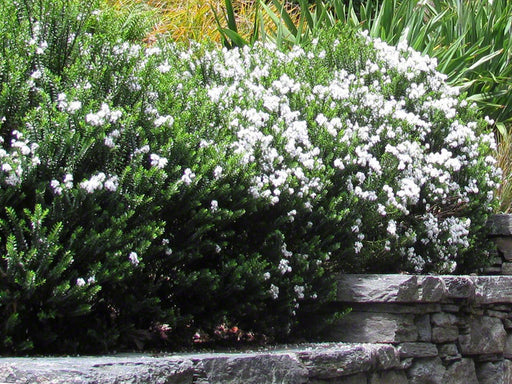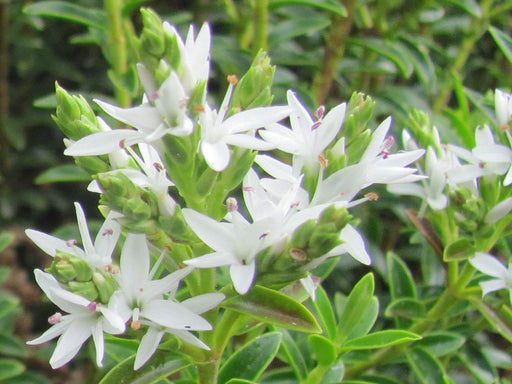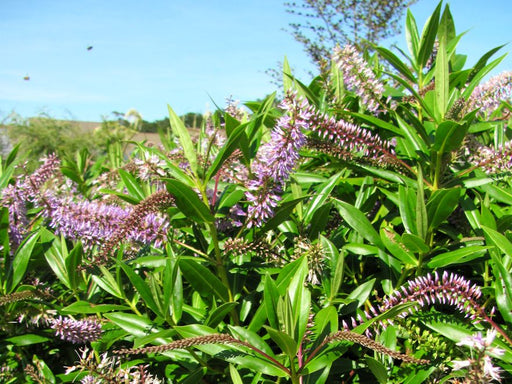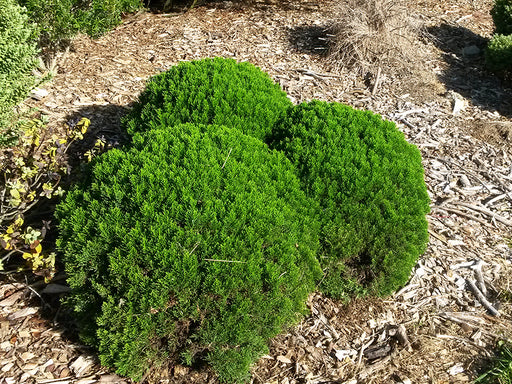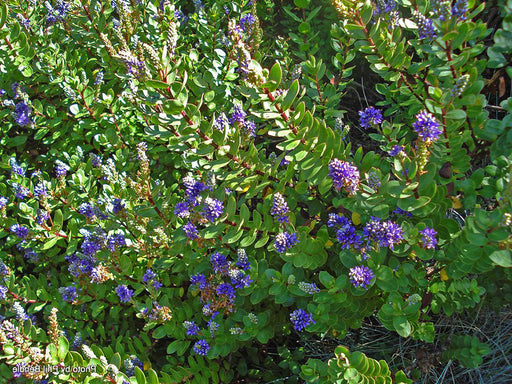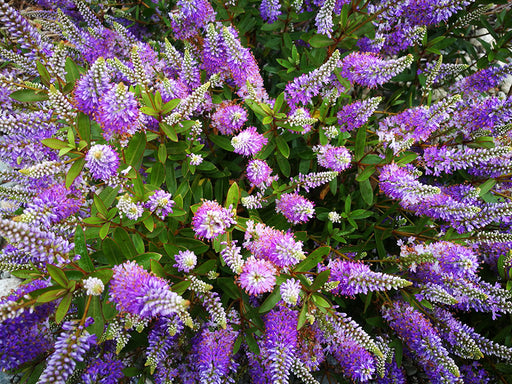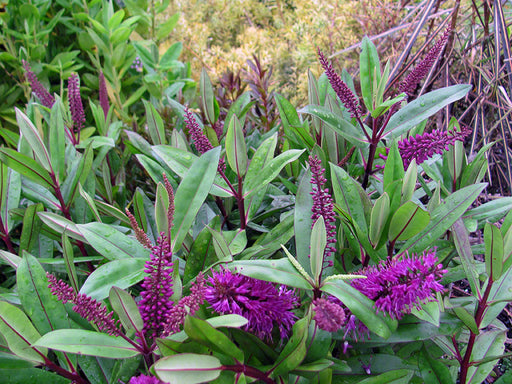Hebes
Compact, colourful, and easy to grow—Hebes are one of Aotearoa’s most loved native shrubs. With varieties ranging from neat groundcovers to bold feature plants, Hebes offer year-round structure, bee-friendly flowers, and excellent drought tolerance once established.
Perfect for borders, hedges, pots, or native gardens big and small. These tough little performers thrive in full sun, handle coastal conditions, and look great all year.
Explore our hardy, nursery-grown Hebes—ready to plant and made to last.
Filters
100x Box Hebe - Box Hebe - $3.99 each
Hebe (Veronica) odora Overview A hardy, compact New Zealand native shrub valued for its glossy foliage and sweetly scented blooms. Hebe (Veronica...
View full details100x Hebe Jasper - $3.99 each
Hebe (Veronica) ‘Jasper’ Overview Hebe ‘Jasper’ is a compact, alpine-style hebe forming a tight, rounded dome of bright green foliage. With its n...
View full details100x Hebe Sutherlandii - $3.99 each
Hebe (Veronica) pinguifolia ‘Sutherlandii’ Overview Hebe (Veronica) pinguifolia ‘Sutherlandii’ is a compact, dense, and highly popular NZ native ...
View full details100x Hebe Wiri Grace - $3.99 each
Hebe 'Wiri Grace' Common Names: Wiri Grace HebeFamily: PlantaginaceaeOrigin: New ZealandPlant Type: Evergreen Shrub Overview: Hebe 'Wiri Grace...
View full details25x Hebe Emerald Gem - $4.99 each
Hebe ‘Emerald Gem’ (Veronica ‘Emerald Gem’) Common Names: Emerald Gem hebeFamily: PlantaginaceaeOrigin: New Zealand (cultivar selection)Plant Type...
View full details25x Hebe Fruticeti - $4.99 each
Hebe (Veronica) fruticeti Common names: Alpine Hebe Family: Plantaginaceae Origin: New Zealand (alpine & subalpine habitats) Plant Type:...
View full details25x Hebe Icing Sugar - $4.99 each
Hebe (Veronica) Icing Sugar Overview A striking medium-sized evergreen shrub admired for its vibrant foliage and beautiful two-toned blooms. Hebe...
View full details25x Hebe Jasper - $4.99 each
Hebe (Veronica) ‘Jasper’ Overview Hebe ‘Jasper’ is a compact, alpine-style hebe forming a tight, rounded dome of bright green foliage. With its n...
View full details25x Hebe Mary Antonette - $4.99 each
Hebe (Veronica) ‘Mary Antoinette’ Overview A striking, free-flowering Hebe with elegant pink-to-lilac blooms and a compact, tidy habit. Hebe (Ver...
View full details25x Hebe Odora - Box Hebe - $4.99 each
Hebe (Veronica) odora Overview A hardy, compact New Zealand native shrub valued for its glossy foliage and sweetly scented blooms. Hebe (Veronica...
View full details25x Hebe Sutherlandii - $4.99 each
Hebe (Veronica) pinguifolia ‘Sutherlandii’ Overview Hebe (Veronica) pinguifolia ‘Sutherlandii’ is a compact, dense, and highly popular NZ native ...
View full details25x Hebe Topiaria - $4.99 each
Hebe (Veronica) topiaria Common names: Topiary Hebe Family: Plantaginaceae Origin: New Zealand Plant Type: Evergreen Shrub Overview Hebe (...
View full details25x Hebe Wiri Grace - $2.99 each
Hebe 'Wiri Grace' Common Names: Wiri Grace HebeFamily: PlantaginaceaeOrigin: New ZealandPlant Type: Evergreen Shrub Overview: Hebe 'Wiri Grace...
View full details5x Hebe Cupressoides Nana - $5.99
Hebe (Veronica) cupressoides ‘Nana’ Overview Hebe (Veronica) cupressoides ‘Nana’ is a dwarf, compact evergreen shrub that forms neat, bun-shaped ...
View full details5x Hebe Emerald Gem - $5.99 each
Hebe ‘Emerald Gem’ (Veronica ‘Emerald Gem’) Common Names: Emerald Gem hebeFamily: PlantaginaceaeOrigin: New Zealand (cultivar selection)Plant Type...
View full details5x Hebe Fruticeti - $5.99 each
Hebe (Veronica) fruticeti Common names: Alpine Hebe Family: Plantaginaceae Origin: New Zealand (alpine & subalpine habitats) Plant Type:...
View full details5x Hebe Icing Sugar - $5.99 each
Hebe (Veronica) Icing Sugar Overview A striking medium-sized evergreen shrub admired for its vibrant foliage and beautiful two-toned blooms. Hebe...
View full details5x Hebe Ohau - $6.99 each
Hebe 'Ohau' (Hebe cultivar) Common Names: Ohau Hebe, Shrubby VeronicaFamily: PlantaginaceaeOrigin: Cultivar (bred in New Zealand); parentage incl...
View full details5x Hebe Red Edge - $5.99 each
Hebe (Veronica) ‘Red Edge’ Overview Hebe (Veronica) ‘Red Edge’ is a compact, eye-catching evergreen shrub admired for its neat, bun-shaped form a...
View full details5x Hebe Sutherlandii - $5.99 each
Hebe (Veronica) pinguifolia ‘Sutherlandii’ Overview Hebe (Veronica) pinguifolia ‘Sutherlandii’ is a compact, dense, and highly popular NZ native ...
View full details5x Hebe Venustula - $5.99 each
Hebe (Veronica) venustula Overview A neat, rounded evergreen shrub with graceful arching branches and glossy yellow-green foliage. Hebe (Veronica...
View full details5x Hebe Waikiki- $5.99 each
Hebe (Veronica) ‘Waikiki’ Overview A medium-growing, compact Hebe with vibrant red-flushed foliage and brilliant blue flower spikes in spring. He...
View full details5x Hebe Wiri Cloud - $5.99 each
Hebe ‘Wiri Cloud’ (Veronica ‘Wiri Cloud’) Overview Hebe ‘Wiri Cloud’ is a beautiful, compact NZ hybrid noted for its toughness and generous ea...
View full details5x Hebe Wiri Prince - $2.99 each
Hebe ‘Wiri Prince’ Overview A compact, free-flowering New Zealand-bred shrub with striking deep violet blooms and glossy dark green foliage. Hebe...
View full details
